Overwhelmed by debt? A bankruptcy chapter 7 attorney can help you achieve financial relief by guiding you through the Chapter 7 bankruptcy process. Filing bankruptcy under Chapter 7 can be a complex process, but with the help of a skilled attorney, it can lead to significant financial relief. Learn how an expert attorney can streamline filing and protect your assets.
Key Takeaways
- Chapter 7 bankruptcy can clear most unsecured debts, allowing for a fresh financial start.
- Choosing an experienced local bankruptcy attorney is crucial for navigating the process and protecting your assets.
- Prepare thoroughly for your bankruptcy filing by gathering necessary documents and being transparent about your financial situation.
- Understanding bankruptcy law is essential for navigating the Chapter 7 process and ensuring compliance with all legal requirements.
Understanding Chapter 7 Bankruptcy

Chapter 7 bankruptcy is designed to provide individuals with a clean slate by discharging most unsecured debts such as credit card debt, medical bills, and personal loans. This powerful legal tool offers a fresh start, allowing you to rebuild your financial health without the burden of overwhelming debt. Relief comes from no longer receiving calls from debt collectors or worrying about wage garnishments.
One of the most reassuring aspects of Chapter 7 bankruptcy is the automatic stay that goes into effect immediately upon filing. This stay halts most collection activities, giving you breathing room to sort out your financial situation without the constant harassment from creditors. Think of it as hitting the pause button on your financial chaos.
However, not all debts can be discharged through Chapter 7. Obligations such as alimony, child support, and certain student loans remain. Despite these exceptions, Chapter 7 offers significant debt relief, potentially wiping out eligible debts within weeks or months.
How to Choose the Right Chapter 7 Bankruptcy Attorney
Selecting the right Chapter 7 bankruptcy attorney is vital for a smooth bankruptcy process. Experience is key. Attorneys like Erik Severino, who have filed thousands of bankruptcies, bring invaluable expertise to the table. Similarly, the Watton Law Group’s 25 years of experience speaks volumes about their capability.
Ensure the attorney you choose is well-versed in state-specific bankruptcy laws. Local bankruptcy lawyers, familiar with the nuances of your state’s regulations, can help maximize exemptions and protect your assets. Guidance from a seasoned bankruptcy attorney can differentiate between a smooth process and a stressful ordeal.
Understanding the procedures and regulations of bankruptcy courts is crucial for a successful Chapter 7 filing, and an experienced attorney can guide you through this process.
Additionally, bankruptcy attorneys offer both short-term and long-term solutions to financial issues. They understand the intricacies of the bankruptcy code and can offer tailored advice to suit your unique situation. Whether it’s navigating the initial bankruptcy filing or strategizing for future financial stability, the right attorney will be your steadfast ally.
Costs Associated with Hiring a Chapter 7 Bankruptcy Attorney
The cost of hiring a Chapter 7 bankruptcy attorney can vary, but many attorneys charge a flat fee ranging from $1,000 to $3,000, depending on the complexity of the case and local attorney rates. These fees must be disclosed to the court and approved to ensure they are reasonable. This transparency helps protect clients from unreasonable charges.
In addition to attorney fees, managing other unsecured debt like credit card balances and medical bills is crucial for a successful bankruptcy filing. There are also filing fees associated with Chapter 7 bankruptcy, totaling $338. This includes a $245 filing fee, a $78 administrative fee, and a $15 trustee surcharge.
Some bankruptcy lawyers provide flexible payment plans or fee waivers for those facing financial hardship, making the process more accessible. Credit counseling courses, which are a prerequisite for filing, can cost between $0 and $50, with potential waivers for those in need.
Affordable Bankruptcy Options
Filing for bankruptcy can be a costly process, but there are affordable options available. At our law firm, we understand that financial struggles can be overwhelming, and we are committed to providing affordable bankruptcy solutions. Our experienced bankruptcy attorneys will work with you to determine the best course of action for your financial situation, and we offer flexible payment plans to make the process more manageable.
In addition to our affordable payment plans, we also offer free consultations to help you determine if bankruptcy is the right option for you. During your consultation, our bankruptcy attorney will review your financial situation, answer any questions you may have, and provide guidance on the bankruptcy process.
We believe that everyone deserves a fresh start, regardless of their financial situation. That’s why we offer affordable bankruptcy options to help you get back on your feet. Contact us today to schedule your free consultation and take the first step towards a debt-free future.
Steps in Filing Chapter 7 Bankruptcy with an Attorney
Filing for Chapter 7 bankruptcy involves several steps, but a skilled attorney can streamline the process. The first step is gathering necessary documents, such as paycheck stubs, bank statements, tax returns, and current investment and retirement account statements. Once these documents are assembled, the bankruptcy filed can happen as quickly as within one to two weeks.
Understanding bankruptcy law is essential for ensuring that all necessary documents are correctly filed and that you comply with all legal requirements.
Upon submitting your bankruptcy petition, an automatic stay goes into effect, halting most collection activities against you. This immediate relief is one of the most significant benefits of filing for Chapter 7 bankruptcy. About a month after filing, you’ll attend a meeting of creditors, where you and your attorney will answer questions about your financial situation and bankruptcy filing.
Engaging a bankruptcy attorney is crucial to navigate these steps effectively. Without one, you risk losing assets that might not be exempt from liquidation. The expertise of a bankruptcy lawyer ensures that all necessary requirements are met and your assets are protected.
Benefits of Hiring a Chapter 7 Bankruptcy Attorney
Hiring a Chapter 7 bankruptcy attorney alleviates the stress associated with the bankruptcy process and offers numerous benefits. These attorneys manage the intricate details of your case, allowing you to focus on rebuilding your financial health. Their expertise ensures that all necessary requirements are met, protecting your assets and maximizing exemptions.
Experienced bankruptcy attorneys are adept at navigating the complexities of bankruptcy courts, ensuring that your case is handled efficiently and effectively.
Experienced bankruptcy lawyers are skilled in safeguarding clients’ belongings from being seized during the bankruptcy process. They can negotiate with lenders to find solutions that protect your home if you’re behind on mortgage payments. Protecting your assets in bankruptcy is best achieved by hiring a local bankruptcy lawyer familiar with state-specific laws and regulations.
Bankruptcy attorneys play a crucial role in navigating complex bankruptcy laws, ensuring compliance, and optimizing the process in bankruptcy court. They can relieve financial stress by providing both short-term and long-term debt relief options, helping you achieve a fresh start.
Qualifying for Chapter 7 Bankruptcy
Individuals must pass a means test that assesses their income relative to state median levels to qualify for Chapter 7 bankruptcy. Meeting the eligibility criteria is crucial for filing bankruptcy under Chapter 7, and a means test is the first step in this process. This test primarily focuses on your current monthly income compared to the state median. If you pass the means test, additional forms regarding your income and expenses are reviewed by the court to confirm your eligibility.
Certain individuals, like veterans, might be exempt from taking the means test altogether. You may still qualify even if your income exceeds the state median by demonstrating sufficient allowable expenses that reduce your disposable income.
If you fail the means test, alternative options like Chapter 13 bankruptcy, which involves a repayment plan, may be recommended by your attorney.
What to Expect During Your Initial Consultation
The initial free consultation with a bankruptcy attorney is typically free and sets the foundation for your financial assessment. These consultations typically last around 40-60 minutes. During this time, the attorney will inquire about your assets, debts, and income to fully understand your financial situation and determine if bankruptcy is a viable option. During your consultation, the attorney will explain how bankruptcy law applies to your specific situation and what steps you need to take next.
Having a rough estimate of your asset values, debts, and income helps provide a more accurate assessment. Bringing copies of required documents, such as paycheck stubs, bank statements, and tax returns, can significantly aid the consultation process. This preparation ensures that your attorney has all the information needed to provide the best advice for your situation.
Preparing for Your Bankruptcy Filing
Specific documentation is required to ensure proper processing of the Chapter 7 bankruptcy petition. You’ll need to collect six months’ worth of paycheck stubs and bank statements, the last two years of tax returns, and current investment and retirement account statements. Additionally, a list of your property with valuations, including estimates for any damaged items, and your credit card and collection statements are necessary.
In addition to paycheck stubs and bank statements, you should also gather documentation related to other unsecured debt, such as credit card balances and medical bills.
After filing, you must provide additional documentation such as paycheck stubs, tax returns, and a course completion certificate for debtor education. The bankruptcy trustee may also request further documents related to your financial situation, including business-related financial statements if applicable.
Adequate preparation ensures a smooth and efficient bankruptcy process.
Non-Dischargeable Debts
While Chapter 7 bankruptcy can eliminate many types of debt, there are some debts that are non-dischargeable. These debts include:
- Tax debts: The IRS and state tax authorities can still collect taxes owed, even after a bankruptcy discharge.
- Student loans: Student loans are generally non-dischargeable, unless you can prove that paying them would cause undue hardship.
- Child support and alimony: These debts are non-dischargeable, as they are considered essential for the well-being of dependents.
- Debts incurred through fraud or deceit: If you incurred debt through fraudulent means, such as writing bad checks or making false statements on a credit application, you may not be able to discharge those debts in bankruptcy.
It’s essential to understand which debts are non-dischargeable before filing for bankruptcy. Our experienced bankruptcy attorneys can help you determine which debts you may still be responsible for after a bankruptcy discharge.
Keeping Your Home in Chapter 7 Bankruptcy
One of the most common concerns people have when filing for Chapter 7 bankruptcy is whether they will be able to keep their home. The good news is that, in many cases, you can keep your home even if you file for Chapter 7 bankruptcy.
In Chapter 7 bankruptcy, the trustee may sell some of your assets to pay off creditors. However, if you have a significant amount of equity in your home, you may be able to keep it by using bankruptcy exemptions. Bankruptcy exemptions allow you to protect a certain amount of equity in your home from creditors.
To keep your home in Chapter 7 bankruptcy, you will need to:
- Be current on your mortgage payments
- Have a significant amount of equity in your home
- Use bankruptcy exemptions to protect your equity
Our experienced bankruptcy attorneys can help you determine whether you can keep your home in Chapter 7 bankruptcy. Contact us today to schedule a free consultation.
Life After Chapter 7 Bankruptcy
Following the approval of a bankruptcy petition, most unsecured debt is eliminated within a few months, providing quick relief from overwhelming financial burdens. The entire Chapter 7 bankruptcy process generally takes just a few months to complete, providing quick relief from overwhelming debt. Creating a comprehensive budget is the initial step in rebuilding your financial health after Chapter 7 bankruptcy.
A secured credit card and small purchases can help improve your credit score after Chapter 7 bankruptcy. Regularly monitoring and disputing inaccuracies on your credit reports is crucial to maintaining accurate credit reports.
Enhancing financial literacy and building an emergency fund are vital for protecting your financial future from unexpected expenses after bankruptcy.
Common Mistakes to Avoid When Filing Chapter 7 Bankruptcy
Disclosing all assets and debts is crucial when filing for Chapter 7 bankruptcy. Hiding assets is illegal and may result in the revocation of your debt discharge. Transparency is crucial when filing bankruptcy, as hiding assets or accruing new debts shortly before filing can lead to complications and potential legal issues. Full transparency ensures that your bankruptcy petition is accurate and that you qualify for the relief you seek.
Another common mistake is accruing new debts shortly before filing, as these debts may be deemed non-dischargeable. Additionally, making preferential payments to certain creditors just before filing can be reversed by the bankruptcy trustee.
Avoiding these mistakes ensures a smoother process and maximizes the benefits of Chapter 7 bankruptcy.
Free Consultations and Legal Aid Options
For those unable to afford a Chapter 7 bankruptcy attorney, legal aid organizations offer free or low-cost legal assistance. Low-income filers within 150% of the federal poverty guidelines may qualify for fee waivers when filing for Chapter 7. Options for those unable to afford an attorney include seeking assistance from legal aid, free clinics, or pro bono attorneys.
Many bankruptcy courts offer free clinics and pro bono services to assist individuals who cannot afford an attorney, providing valuable support during the bankruptcy process.
Consultations for bankruptcy attorneys in Dallas and Fort Worth, as well as Las Vegas, are free. Additionally, common sources of financial help for attorney fees include friends, family, and employers. For those in dire financial straits, stopping debt payments to afford the attorney or borrowing fees might be necessary.
Summary
In summary, Chapter 7 bankruptcy offers a viable path to financial freedom by discharging most unsecured debts and providing a fresh start. Understanding bankruptcy law is essential for navigating the Chapter 7 process and ensuring compliance with all legal requirements. The guidance of a skilled bankruptcy attorney can make the process smoother, protect your assets, and ensure compliance with complex bankruptcy laws. From initial consultations to life after bankruptcy, the journey requires careful planning and informed decisions.
Embarking on this journey with the right support can transform your financial future. By understanding the process, costs, and benefits, you can make informed choices that lead to long-term financial health. Remember, the goal is not just to survive but to thrive and build a secure financial future.
Frequently Asked Questions
What types of debts can be discharged through Chapter 7 bankruptcy?
You can get rid of most unsecured debt like credit card bills, medical expenses, and personal loans through Chapter 7 bankruptcy, but keep in mind that things like alimony, child support, and some student loans won’t go away. So, it’s a fresh start for many debts, but not for all!
How much does it cost to hire a Chapter 7 bankruptcy attorney?
Hiring a Chapter 7 bankruptcy attorney usually costs between $1,000 and $3,000, plus a filing fee of $338. Many attorneys also provide flexible payment options to help ease the burden.
What is the automatic stay, and how does it help?
The automatic stay is a powerful tool that stops most collection activities as soon as you file for bankruptcy, providing you much-needed relief from creditor harassment and a chance to get your finances in order. It’s a crucial step towards regaining control of your financial future.
What should I bring to my initial consultation with a bankruptcy attorney?
Make sure to bring a rough estimate of your assets, debts, and income, along with copies of your paycheck stubs, bank statements, and tax returns to your initial consultation. This will help your attorney give you the best advice possible.
How long does the Chapter 7 bankruptcy process take?
The Chapter 7 bankruptcy process typically takes a few months to complete, with most eligible debts being discharged within weeks after the petition is approved. It’s a fast route to gaining relief from overwhelming debt.




